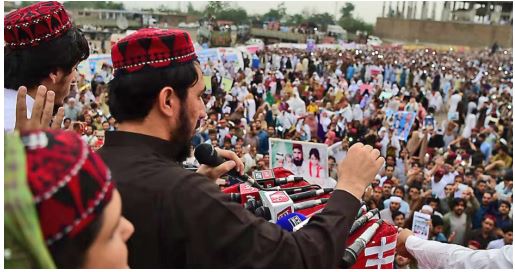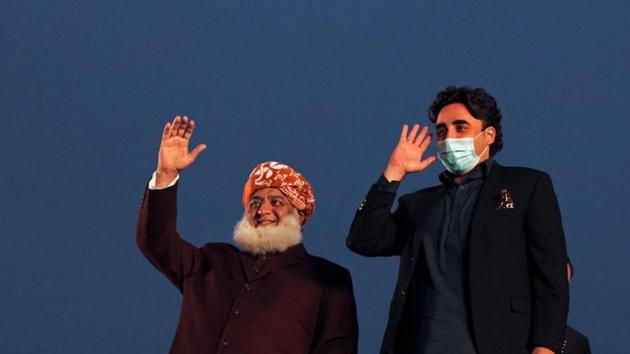Dissonances: A Detour through Lukacs
Strange times abound in the land of the Pure. From 63-A to 184(3), articles of the Constitution are affirmed at one moment, only to be upturned and challenged in another – often by the same august bench. The Constitutionalists of yesterday are the Hybriders of today, the Hybriders of yesterday are the Constitutionalists of today. Those who once asked for izzat for the vote are intent on delaying elections. From Ijaz-ul-Haq to Omar Ayub and Sheikh Rasheed, dictator-spawn of yesteryear now join the ostensible party of ‘anti-establishment’.
Dissonances and disagreements abound among the intelligentsia too. On one side is the advocacy of principle over unsavoury realities. Constitutional imperatives must be obeyed, the principalists argue, regardless of the obviously authoritarian aims and inclinations of the actors (Imran Khan and PTI) poised to take advantage. On the other side, legal gymnastics are justified with a view to keep a reactionary force at bay, one which itself resorted to every underhand and coercive measure and then some in its own years of hybrid stage-sharing.
To put it succinctly, the mainstream discourse on the multi-sided conflagration between the PDM, PTI, (un)holy cows, and the benches remains stuck in a dichotomy between facts versus values, means versus ends. For those of a more critical and epistemological bent, it is easy to recognise in this binaristic framing echoes of the ‘Antinomies of Bourgeois Thought’ that Gyorgy Lukacs explicated almost exactly a century ago in his classic text History and Class Consciousness.
In the backdrop of revolutionary upsurges all over Europe, Lukacs elaborated in detail how the tradition of liberal thought culminating in Kant was unable to find a way out of related oppositions: between appearance and essence, form and content, subjectivity and objectivity, values and facts, means and ends. Stuck in its dualities, liberal thought was thus destined to flounder from one pole to another under pressure of circumstance. In his critical inheritance of the revolutionary tradition, Lukacs proposed to move beyond such polarities by focusing on their production in history and practice.
For Lukacs, the above-mentioned are not invariant axes of human existence, but it is human activity in history itself which generates polarities between subject and object, thought and being. For example, where the working masses themselves create the social world, in an alienated and class-divided society as it stands, such a world and its institutions come to dominate the creators themselves: object becomes subject, subject becomes object. Thus, an opposition is created between subjectivity and objectivity, whereby the latter comes to dominate the former even while the subjects retain the potential to create the object (i.e., the world) anew.
As such, not just the values and principles through which we grasp reality, but the very object of thought (the world or reality) is not given once and for all. Objective reality is constantly created and changed by humanity’s historical activity. Bourgeois thought remains stuck in its antinomies – valourising principles and values in one moment, only to turn its back and extol facts and reality in another – until it can learn to think itself historically i.e., until it can historicise itself, both its ‘facts’ and ‘values’, in human social activity.

However, ensconced as it is at the top of the social structure, bourgeois thought cannot think historically, as genuinely historical thinking would give the lie to its own comforting myths of invariant and natural dominance. Epistemologically crippled, unable to face its own historical relativism and limits, bourgeois thought flounders.
It is in the face of such disavowal, that a critical theory and its popular bearers can potentially come into their own. For by affirming their role at the center of social reality, the masses can upend aforementioned dichotomies, to create new objects and subjects, new forms of being and thought, new relations between form and content i.e., a society of genuine self-determination and solidarity, over one characterised by an oppositional relationship between the individual and the collective, the particular and the universal. Sensitised by his experiences of the Hungarian and Soviet Revolutions, Lukacs thus overcame the antinomies of his neo-Kantian inheritance by centering the role of the masses in history.
The Punctual and the Historical
In many respects, the mainstream discourse around the PTI, PDM, and the latest shenanigans of the benches and the generals remains at the level of appearances that Lukacs diagnosed as characteristic of bourgeois thought’s antinomies. On the one side there is a concerted focus on the ends i.e., the elimination or at least a cutting down to size of the PTI which is here characterised as a ‘fascist’ or ‘quasi-fascist’ force, and thus a mortal threat to the social order and polity. On the other, there is a wish to uphold the ground of constitutional edicts and principles, and/or to ride the coattails of the PTI in another attempt to reign in the perennially-unbalanced ‘civil-military equation’.
It is in their lack of historical and social depth that both these vantage points remain a surface level appreciation of the situation in Pakistan. Indeed, the crisis in Pakistan today overflows the bounds of constitutional ambits and civil-military relations, even while finding most obvious expression in the shifting alliances around theses axes. In its proximate historical context, this overflow of the social beyond its established coordinates of recognition and mediation, is conditioned by the manoeuvres of the praetorian guard and its (uneasy) civilian hangers-on since the return to formal democracy in 2008.
It is the military establishment which undoubtedly has the greater structural power in this diarchy. From the constant stream of revelations by the seemingly chastened retired army chief, to the many cajolements and coercions of DG-Cs and their Twitter champions, the container dharna in 2014, the Faizabad dharna in 2017, the judicial manipulations of 2017-18 and beyond – it is clear that not only will the military not give up power voluntarily, its attempts at constantly expanding its spheres of authority and appropriation brings it into regular contradiction with the civilian side of the polity.
The civilians, however, have hardly distinguished themselves. From Memogate to ratification of military courts; from supine acquiescence to land grabs and unaccountable military operations to enthusiastic cheerleading of extension-seeking generals; from Quetta Cantt-direct political engineering in the Balochistan assembly to the Sanjrani fiasco in the Senate – all manoeuvres of the praetorian guard have been happily acquiesced to by one or another self-proclaimed bearer of democratic values. The consensus on marketisation of public services and IMF-prescriptions for the economy is, with minor differences, shared across the political spectrum. Most recently, the judicial and parliamentary manoeuvrings around the Reko Diq mining project have effectively cancelled the much-proclaimed federalism of the 18th Amendment, this time at the behest of international capital.
In short, what we have witnessed since the return to formal democracy in 2008 is a steadily rightward-shifting permutation of alliances between the military and civilian fractions. Actors both military and civilian have, at each turn, relied on extra-parliamentary means and on forces further to the right to undercut their opponents – thus paving the way for the current right-wing insurgency. The slide in these years from the defanged centrism of the PPP coalition to the centre-right PMLN and the right-populist PTI-Bajwa hybrid regime is thus both unmistakeable and of an identifiable trend. That the military itself is now challenged by a force that is further to its right (i.e., the Khan-cult) should thus come as no surprise. Waqt karta hai parwarish barson…
It is also in this proximate history of the rightward shift of the polity that clues may be found as to its wider historical and social – i.e., structural – coordinates. The constant pandering to forces of the right by incumbent rivals (civilian and military) to undercut other fractions is itself related to their wider social inadequacies. An alternative to this reliance on the right or the military would be the forging of a deep-rooted and alternative popular base. The development of such an alternative popular base in turn requires a wide-ranging project of socio-economic transformation. It is only based on a sustainable project of accumulation and concessions that a stable compromise can be generated both among those at the top and among a substantive proportion of those at the bottom.
Indeed, such a project would require a degree of material self-abnegation – ranging from thorough-going rural and urban land reforms, progressive taxation, and universalisation of public services – that Pakistan’s ruling castes have historically proven themselves incapable of. In the absence of such a project of accumulation at the top and concessions at the bottom, the ruling elite have relied on various forms of imperial arbitrage to shore up their rule – such as through selling the labour power of the citizenry and, most consistently, through selling their military services to imperial and sub-imperial powers.
It is this lack of deep social bases that conditions the ruling bloc’s resort to vertical patronage networks, glamorous ‘model projects’, and ‘low-intensity’ forms of representation for absorbing popular classes. In the absence of broad bases of consent, there is a preponderance of coercive means to maintain coherence in polity and society. Added to this is the historical role of the ruling bloc as the regional gendarmerie of US-led imperialism. It is this confluence of narrow bases of accumulation, with the resulting resort to coercive consent-generation and imperial coddling, that has turned the Pakistan military into the behemoth it is today.
Unwilling and indeed unable to muster popular social bases and actual sacrifices of one’s own privileges and pelf, a combination of praetorianism, patriotism, and patrimonialism thus comes to stand as a substitute. The resort to military authoritarianism and reactionary right-wing formations to shore up narrow bases of rule (or, conversely, to challenge incumbents) is of the same trend – one conditioned by the objective failings of the ruling bloc as a whole, rather than simply a subjective will to deceive and dissimulate.
The preponderance of the military in the polity is, therefore, not simply or even primarily a problem of a lack of agreement over the liberal-democratic ‘rules of the game’ or a merely subjective failing to subscribe to Constitutional ambits. The civil-military structuring of the political level, along with the praetorian-Islamist dominance at the ideological level, are thus concretely linked to the historical and social failings of the ruling caste.
Relatedly, the lack of broad absorptive capacity in the ruling classes’ political and economic modus operandi, leads to always-present reservoirs of discontent and alienation which can lend themselves to populist upsurges. Indeed, this alienation may be of either the historically privileged (e.g., PTI-led middle classes) or those at the bottom (e.g., the lumpen youth of the TLP or brutalised peripheral masses of the PTM).

Here too, the historical reliance on patriarchal-militarist solutions to social and political problems, leavens the terrain for repeated right-wing insurgencies. Just in recent history, one can see the shifting confluence of the military, (with the TTP and today with the PTI) as testaments to this fertile terrain for right-wing mobilisation and its potential to overflow the coddling of the praetorian guard. In many ways then, the Khan cult and its hysterical shenanigans today are not the situation itself, but merely the symptom of a situation.
Today, with the coordinates of the global order shifting, financial flows from imperial gendarmerie for the Pakistani ruling bloc have dried up. Without resort to a regular flow of aid and guns from the US, with the IMF and international finance demanding their pound of flesh, and with Chinese largesse limited due to multiple disappointments regarding CPEC, the cement holding together the prevailing order in Pakistan has fundamentally given way.
Barbarism: The Inadequacy of Form
The confluence of crises today, therefore, is profound and potentially explosive: narrow bases of accumulation; the ruling caste’s structural inability to sacrifice short-term gain for long-term stability; limited bases of absorption and consent; an ever-present and growing mass of the disaffected and alienated; the constant resort to right-wing dissimulations as (non-)solutions to social contradictions; and finally, the drying up of imperial salve to paper over structural cracks.
It is this coming together of the historical and the proximate, the structural and the punctual, that conditions the seemingly intractable faultlines in Pakistani society today – culminating in the ‘mainland’ of the Takht-e-Lahore and into the very heart of the state apparatus itself. Elections or no elections, full or three-member bench, Khan or minus-Khan, in the absence of any project of salvation (imperial or domestic), the means of even a semblance of stability, of even a modicum of coherence have well and truly given way to an unprecedented situation. The dizzying array of alliances, the confusing melange of shifting loyalties, the unravelling of the already paper-thin coherence of hybrid regimes and constitutional interpretations, is thus an index of the exhausted structural bases of the prevailing order.
Existing coordinates of mediation no longer sufficient, it is no surprise then that mainstream and liberal thought struggles to come to grips with the situation. Usual conceptions of ends and means, facts and values, reality and principles, force and constitutionalism are no longer able to provide coherent diagnoses of a situation which overflows such limited bases of comprehension. The deep ruts of the social and the historical escape their representation in language. The content has well and truly outstripped the form.
Here then we come full circle back to Lukacs. For as described above, the stated presumption and resolution of Lukacs’ enumeration of the antinomies of bourgeois thought is in the self-directed movement of the working masses themselves. In the absence of such movement, the denuding of the horizon of radical and transformative possibilities, the social order appears frozen to mainstream thought. However, with the social order itself in flux, but in the absence of a popular force which can shift the coordinates of possibility and comprehension, the antinomy of means and ends, principles and reality, finally reveals its inadequacy in full.
The long lines of containers at Karachi port, the deathly stampedes at lines of wheat distribution up and down the country, the judgements and counter-judgements among the benches, and the intractable contradiction reached between the Constitutionalists and the realists, are thus of a family. They are an index of the stasis arrived at, due to processes both long-standing and proximate.
As for the working masses of the country – caught between carousels of wealth and indifference at the top and insurgencies from the right – the impending barbarism, the dejection of death finds its echo in the tragic denouement delivered in ‘Ghosts’ by the great playwright Henrik Ibsen. Here, the severely disabled Oswald suffering from a debilitating venereal disease, asks his mother to help him die:
Oswald: You will have to help me now, mother.
Mrs Alving: I?
Oswald: Who should do it if not you?
Mrs Alving: I? Your mother?
Oswald: For that very reason.
Mrs Alving: I, who gave you your life!
Oswald: I never asked you for life. And what kind of life was it that you gave me? I don’t want it! You take it back!
The writer is a university lecturer, with research interests in Marxist and anti-/postcolonial theory.



